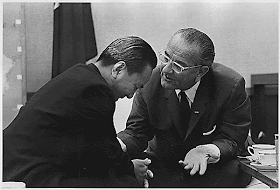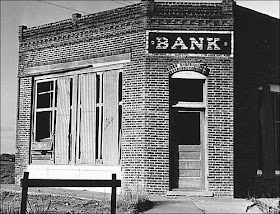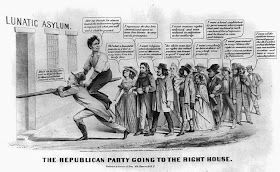I have a theory about politics, and it goes like this: each generation fights its father's battles. The prime example of this turns out to be conspiracy’s step-child, Richard Milhouse Nixon. After his two brothers died of tuberculosis, “Tricky Dick” became an over achiever riddled by survivor's guilt who inherited his father's inferiority complex and explosive temper along with his mother's stoic martyrdom in the face of her husband's violence. I shall now pause for a round of applause from all amateur psychologists reading this blog. But to go a step further - this oversimplification explains how the only President forced to resign could still insist, long after the Watergate scandal brought him down, that “when the President does it, that means that it is not illegal”. But does that also apply to what you do to win the office?
In 1968 there were half a million Americans draftees fighting in South Vietnam. The 12 year war had already killed 30,000 Americans, almost as many as died in the Korean War. Three hundred more Americans were dying every week. And every week the Pentagon was spending $1.5 billion on a war President Lyndon Johnson was belatedly trying to end. The complication was that 1968 was also a Presidential election year. The war had grown so unpopular that in March, Johnson had withdrawn from the election, removing himself as an issue. And despite the blood and treasure spent in Vietnam by their party, the Democratic candidate, Vice President Hubert Humphrey, still held a slim lead in the polls over the likely Republican challenger, one time Vice-President Richard Nixon.
On Friday, 10 May, 1968 North Vietnam and the United States began secret talks in a Paris hotel on the Avenue Kleber (pronounced clay-bear). The first difficult issue to be decided was the shape of the table, because it really should have been three party talks. South Vietnamese President, Nguyen Van Thieu (above), had gambled his life, and the lives of everyone he loved, on defeating the communist Viet Minh guerrillas, controlled by North Vietnam. That struggle had so far cost South Vietnam over 100,000 military, and close to 200,000 civilian deaths. Thieu and his supporters had earned a place at the table in Paris. President Johnson wanted them there. But North Vietnam stubbornly refused to recognize Thieu's government, or even sit down at any shaped negotiating table with them. And Thieu agreed. He was worried the Americans might compromise him into a corner, allowing the communists to easily take power once the Americans left.
On Sunday, 12 July, 1968 another secret meeting took place, this one in Richard Nixon's 39th floor suite at the Pierre Hotel, just off Fifth Avenue on East 61st Street, in Manhattan. Nixon's co-hosts were his closest adviser John Mitchell, and Republican activist and unofficial leader of the Taiwan anti-communist lobby, Anna Chennault . The single guest, brought there by Mrs. Chennault, was the South Vietnamese ambassador to the United States, Bui Diem. Both Chennault and Diem have left accounts of the meeting, at which Nixon assured Diem the South Vietnamese would get “better treatment from me than under the Democrats,” and that “his staff would be in touch with (Diem) through...Anna Chennault.”
Anna was the widow of American Lieutenant General Claire Chennault, commander of the “volunteer” Flying Tigers, American flyers who battled Japanese bombers over China before Pearl Harbor. After the war the general had set up the Flying Tiger Line, an air transport service based in Taiwan, and bankrolled by the CIA. When the 65 year old general died of lung cancer in 1958, he left his 33 year old widow a multimillionaire. She was brilliant in her own right, and a constant supporter of the man who had actually “lost” China to the communists, Generalissimo Chiang Kai-shek. Under Eisenhower, “The Dragon Lady” had become a powerful Republican fundraiser. Her sole drawback, in Nixon's own words, was that, “she's a chatterbox.”
After the secret meeting in the Pierre, Diem became a regular at parties Anna hosted in her Penthouse in the Watergate complex in Washington, D.C. And she became a regular in Saigon, capital of South Vietnam. There she talked directly with President Thieu. What they talked about is not recorded, but Thieu began to take a harder line regarding the now weekly secret Paris talks. Nixon was aware of the lack of progress in Paris, thanks to Bryce Harklow, an Eisenhower aide and self described “double agent”, who had stayed on through the Kennedy and Johnson administrations. And as the election approached. Harlow told Nixon, Johnson was planning an “October Surprise” and a “Halloween Peace”, to help make Humphrey President. Nixon had no doubt it was true, thanks to his other mole, Professor Henry Kissinger.
Since he was very smart, as far back as 1966 Harvard Professor Henry Kissinger (right, above) became convinced any military victory in South Vietnam would prove useless, unless it also produced “a political reality that could survive our ultimate withdrawal”. Because of this he helped start the two party Paris talks. But he was also intensely ambitious, and in August, when the North Vietnamese ordered their troops in the two northern provinces of South Vietnam to stand down, Kissinger warned Nixon (left, above) that the war might be coming to an abrupt end, thus invalidating Nixon's twin campaign ads of “Peace With Honor”, and “Nixon's The One” - the who would end the war. John Mitchel immediately called Anna Channault (center, above).
Anna said latter that Mitchell called her “almost every day” that summer,, always with the same message – don't let Thieu go to Paris. In her autobiography Anna explained, “My job was to hold him back..” Negotiations with North Vietnam might be part of Kissinger's “political reality”, but Anna assured the “Little Dictator” (above), that Nixon would secure a better peace for South Vietnam. She later wrote “Throughout October 1968 Thieu tried to delay... as long as possible to buy time for Nixon.” Thieu would later tell Ambassador Diem that “a Humphrey victory would mean a coalition government in six months.” And, of course, an end to the war.
But Johnson (above) had heard hints of Nixon's back channel, from Florida Democratic Senator George Smathers, who was friends with both Johnson and Nixon. And the President was also warned about a stock tip being offered by Wall Street money man and Nixon supporter, Alexander Sachs. Sachs was quoted by Walt Rostow as saying a quick peace was unlikely because Nixon would,
“incite Saigon to be difficult and Hanoi to wait.” In response Johnson ordered the National Security Agency and legendary director of the F.B.I, J. Edgar Hoover, to bug his own government, including ambassador to South Vietnam, Ellsworth Bunker, and the Nixon campaign's leadership. Hoover won the race for the dirt, quickly producing a call on Bunker's private phone from Anna Channault, who urged the ambassador to tell Thieu to “Just hang on through the election.”
“incite Saigon to be difficult and Hanoi to wait.” In response Johnson ordered the National Security Agency and legendary director of the F.B.I, J. Edgar Hoover, to bug his own government, including ambassador to South Vietnam, Ellsworth Bunker, and the Nixon campaign's leadership. Hoover won the race for the dirt, quickly producing a call on Bunker's private phone from Anna Channault, who urged the ambassador to tell Thieu to “Just hang on through the election.”
Finally, on 31 October, 1968, Johnson announced on national television that because of recent conciliatory moves by North Vietnam (the stand down in the northern provinces), he was halting American bombing. Johnson also went public about the Paris peace talks, next to be held the day after the American election. But he was able to announce only that South Vietnam was “free to participate” in the talks as well. Two days earlier, President Thieu had informed Johnson that he would absolutely not be attending the Paris talks, relying instead on Nixon's promise of a better deal after his victory in November.
Two days later, on 2 November, Johnson called the Republican Senate Minority Leader, gravel voiced Everett Dirkson. The recording of that call is in the L.B.J. Presidential Library. On the tape Johnson quoted from Anna Channault's call to Bunker, so Dirkson would have no doubt he had the evidence. He then told the Republican, “They oughtn’t be doing this. This is treason.” Dirkson replied, “I know,.” and promised to call Nixon. Johnson then brutally drove his point home. “They’re contacting a foreign power in the middle of a war...and if they don’t want it on the front pages, they better quit it.”
A day later, Nixon called Johnson and smoothly lied. He assured Johnson, concerning sabotage of the Paris peace talks, “There’s absolutely no credibility as far as I’m concerned.” But unknown to Nixon it was caught on tape by the National Security Agency. The NSA also had a recording of a phone call between Republican Vice Presidential candidate Spiro Agnew and Ann Channaut discussing her lobbying of Thieu. With still 2 days before the election, Johnson might have released some or all of those recordings. After conversations with his staff he decided not to do so, because it would taint the credibility of whoever won the election. For the good of the nation, Johnson kept his mouth shut.
Nixon won the Tuesday, 5 November, 1968 popular vote by just over 500,000 – about 0.7%,, but he took the electoral college decisively, with 31 votes to spare, 301 to 191 for Humphrey, During November and December, despite pleadings from Johnson to push Thieu to come to Paris, Anna Channaut kept up reassuring The South Vietnamese President to hold out until Nixon took the oath of office in January. Once elected, President Richard Nixon did begin withdrawing American troops, but he also funded an increase in the South Vietnamese Army, from 800,000 in 1968, to a high of 110,000 in 1973 – just before their collapse in the face of a North Vietnamese offensive. What happened in 1973 was Watergate, a scandal which increasingly consumed Nixon's time and political power. And that started with the failed Watergate break in on 17 June, 1971
On that day the White House recording system heard President Richard Nixon ask his chief-of-staff “Bob” Halderman a simple question:”Do we have it?” He had ordered the break in of the Democratic headquarters, searching for Lyndon Johnson's copy of Anna Channault and Spiro Agnew's phone calls from the fall of 1968. He was worried it might be released to defeat that his re-election in November of 1972. And when Halderman hinted there might be a copy at the Brookings Institute on Long Island, Nixon ordered, “Goddammit, get in and get those files. Blow the safe and get it.” Two weeks later, still demanding action from his wary staff, Nixon told Halderman, “Talk to Hunt. I want the break-in.” And thus began a two year search, largely conducted by ex-CIA agent E. Howard Hunt and his “Plumbers” unit, to find the record of Richard Nixon's duplicity on the Vietnam War, and failing that, to collect dirt on anyone who might have the file, such as Daniel Ellsberg, the source of the “Pentagon Papers”, and a logical repository for that tape . But the tape and Johnson's files were no longer in any of the places Nixon was looking.
Just before he left the White House, Lyndon Johnson had entrusted the file to Walt Rostow, who kept it with his personal papers. Rostow knew what was in the file. And when the Watergate scandal took flame over the summer of 1973, he wrote a memorandum (above) to be included in the file, and then wrote on the cover, “Top Secret. To be opened by the Director, Lyndon Baines Johnson Library, not earlier than fifty (50) years from this date, June 26, 1973.” But the library waited only twenty years, and then began the protracted process of declassifying the contents. That took another twenty years, before the great question of the Watergate scandal was finally answered - why did Nixon send a collection of ex-CIA Cuban-Americans into the DNC headquarters on 17 June, 1972? And the answer was; the 27,257 Americans who died in Vietnam, the tens of thousands of wounded who suffered during the 5 years Richard Nixon kept the war going for his personal benefit.
- 30 -

































































